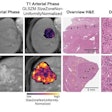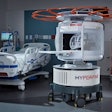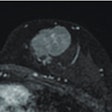Monday, November 30 | 11:10 a.m.-11:20 a.m. | RC215-13 | Arie Crown Theater
An abridged breast MR protocol has shown high sensitivity but only moderate specificity in a screening population of women at intermediate and high risk for breast cancer, which could mean high rates of follow-up imaging.That's according to a study conducted by researchers at New York University, where presenter Dr. Claudia Seuss and colleagues looked at 86 women who underwent 114 breast MRI exams between December 2011 and December 2013. All of the women were at risk for breast cancer and had dense breast tissue.
One reader prospectively interpreted the MRI results for an abbreviated protocol by reviewing the first postcontrast scan and a T2 scan from the MRI exams, as well as prior studies; this reading was then compared with the original diagnostic interpretation. Finally, two additional readers retrospectively reviewed the abridged exams.
For the prospective review, the abridged protocol's sensitivity was 100% and its specificity was 71%, with an additional 14 abnormal findings identified that proved not to be malignant. Specificity for the retrospective review of the shortened protocol ranged from 59% to 76%.
The study demonstrates that although an abridged breast MR protocol is good at finding abnormalities, it may do so at the cost of a higher rate of follow-up imaging to resolve ambiguous lesions, according to Seuss' group.



.fFmgij6Hin.png?auto=compress%2Cformat&fit=crop&h=100&q=70&w=100)





.fFmgij6Hin.png?auto=compress%2Cformat&fit=crop&h=167&q=70&w=250)











